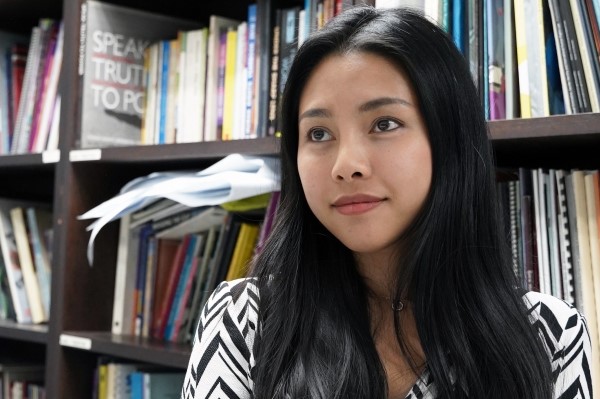The Supreme Court has dismissed a defamation lawsuit against former Voice TV reporter Suchanee Cloitre filed by the Thammakaset Company on the grounds that her report was criticism made in good faith.

Suchanee Cloitre
The company, a supplier of poultry to the agribusiness company Betagro, launched the defamation lawsuit against Suchanee after she posted a tweet about the defamation case that the company filed against migrant workers who had filed a complaint with the National Human Rights Commission of Thailand (NHRC), claiming mistreatment by the company.
The workers’ complaint said that they had been forced to work up to 20 hours per day without a day off for 40 or more consecutive days, that they had been paid less than the minimum wage, were not paid for overtime, and that they had their freedom of movement restricted, and their identity documents confiscated.
In 2016, Thammakaset sued them for defamation, claiming that their complaint damaged the company’s interests.
In September 2017, Suchanee retweeted a message from former Migrant Workers Rights Network (MWRN) advisor Andy Hall, adding a comment which said that the court ordered the Lop Buri chicken farm owner to pay compensation to the 14 migrant workers “for using slave labour.”
In November 2017, a company representative filed a complaint with local police in Lopburi, but the public prosecutor dismissed the case on the ground that Suchanee was reporting on the court ruling as a journalist and did not intend to cause damage to the company. In March 2019, the company filed charges against Suchanee directly with the Lopburi Provincial Court.
On 24 December 2019, the Lopburi Provincial Court sentenced Suchanee to two years in prison, ruling that her tweet is defamatory because the phrase “slave labour” did not appear in Hall’s post or the court ruling he attached to his post and is therefore damaging to the company. Because the court believed that Suchanee posted her tweet without considering the damage it could cause to the company, and that she had not checked whether her message was accurate, the court considered that Suchanee’s action was not in good faith.
Suchanee and her lawyer filed an appeal. On 23 October 2020, the Appeal Court dismissed the case on the grounds that, as a journalist, Suchanee has received information from directly interviewing the workers, and even though her phrasing was not the same as the Court ruling, it attracted readers and is also used by foreign media. It therefore ruled that her tweet was criticism made in the interest of the public and in good faith, which is not considered defamation under Thai law.
The case then went before the Supreme Court, which dismissed it today (9 August) on the grounds that Suchanee was expressing her opinion in good faith. The Court said that a Voice TV report Suchanee wrote, which mentions an investigation made into Thammakaset by the National Human Rights Commission (NHRC), reflects that her tweet was based on the information she had. The Court also said that it has no reason to believe that she was biased in her reporting, or was doing so to gain advantage over the company or to gain benefit for herself or her employer.
The Supreme Court also said that it agreed with the Appeal Court’s ruling that Suchanee has the right to criticize or express opinions about the company in good faith and in the interest of the public as a citizen and as a journalist whose job is to report about labour rights. Her tweet is therefore not considered defamation.
Suchanee told Voice TV that she is happy for the case to be over and thanked the court for giving her justice. She said that it is necessary for journalists to report about human rights, which concern marginalized groups often ignored by the rest of society, such as migrant workers, and insisted that the media must report about things that are in the public interest.
Suchanee’s case is one of at least 39 criminal and civil defamation lawsuits that Thammakaset has filed against journalists and human rights advocates who spoke out against its labour rights violations, including former Thailand human rights specialist with Fortify Rights Sutharee Wannasiri, former Fortify Rights Communications Associate Thanaporn Saleephol, Mahidol University lecturer Ngamsuk Rattanasatien, and former National Human Rights Commissioner Angkhana Neelapaijit.
According to the report ‘Truth Be Told: Criminal defamation in Thai law and the case for reform’ published in March 2021 by ARTICLE 19, criminal defamation lawsuits are on the rise in Thailand, as data obtained from the Office of the Attorney General shows that between 2015 and 2019, the number of cases submitted to the Court of First Instance increased from 1386 to 2023. The report also says that there were 10,141 defamation lawsuits between January 2015and September 2020, 8,397 of which resulted in a conviction.
ARTICLE 19 noted that the criminal defamation law has been used against individuals raising concerns about human rights and labour rights violations, corruption, or government or corporate failures, causing these people to endured lengthy legal proceedings before being acquited. Such lawsuits and the accompanying threat of imprisonment create a climate of fear and self-censorship, which the organization said is “severely inhibiting journalism and weakening civil society.”
Prachatai English is an independent, non-profit news outlet committed to covering underreported issues in Thailand, especially about democratization and human rights, despite pressure from the authorities. Your support will ensure that we stay a professional media source and be able to meet the challenges and deliver in-depth reporting.
• Simple steps to support Prachatai English
1. Bank transfer to account “โครงการหนังสือพิมพ์อินเทอร์เน็ต ประชาไท” or “Prachatai Online Newspaper” 091-0-21689-4, Krungthai Bank
2. Or, Transfer money via Paypal, to e-mail address: [email protected], please leave a comment on the transaction as “For Prachatai English”
